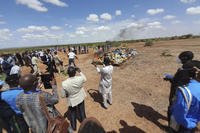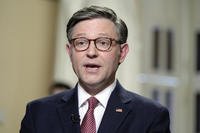Flanked by Vice President Joe Biden, Defense Secretary Robert Gates, Adm. Mike Mullen, and Gen. David Petraeus in the Rose Garden, a somber American president announced the resignation of his top commander in Afghanistan and made clear he will tolerate no more dissension among his national security team.
President Barack Obama declared that Gen. Stanley McChrystal had conducted himself in an "unacceptable" manner and that it had undermined "civilian control of military that is at the core of our democratic system."
A former Republican Pentagon official who knows McChrystal well and helped select him for the Joint Special Operations Command, said that the president's decision was, "understandable because civilian control of the military must be maintained and not be denigrated. But," said Marshall Billingslea, who headed the Special Operations and Low Intensity Conflict office, "the nation nevertheless owes Stan McChrystal a tremendous debt of gratitude. The nation is safer today because of Stan."
Obama, who noted McChrystal's service, made very clear that his "team of rivals" must stand together from now on -- immediately after announcing that Gen. Petraeus would take over from McChrystal,. The sniping and outright policy disagreements that have marked the conduct of Richard Holbrooke, Karl Eikenberry and McChrystal will end, the president said: "I've just told my national security team that now is the time for all of us to come together."
Obama said he "welcomes debate, but won't tolerate division."
The next step lies with the Senate, which must confirm Petraeus in his new job. The president urged the Senate to confirm the general "as swiftly as possible." All four-star generals are confirmed for each new job. Some senators may use the nomination hearing to question the administration's policies and strategy in Afghanistan. It's too early to predict whether this might delay the nomination, but it is possible.
Initial reaction to the president's move was largely positive, especially his choice of Petraeus. "I doubt that he would keep CentCom," said retired Army general Jim Dubik, now at the Institute for the Study of War. "They could ask him to do that. But I can’t imagine they could expect him to do the regional engagement stuff and the particulars of Afghanistan."
Should Petraeus leave his CentCom job, as appears likely, Gen. Ray Odierno is a likely candidate to replace Petraeus, several sources said.
What changes will Petraeus bring to the job? One former Pentagon official said the extra gravitas, the enormous credibility that Petraeus brings to the job -- what some call his rock star quality -- will enable him the freedom to keep troops on the ground in substantial numbers come the deadline of July 2011 should the need arise. "That date is dead now," this source said.
"If the price of picking Petraeus turns out to be sticking with the counter-insurgency campaign in Afghanistan well beyond the current timetable, then it may be President Romney or President Palin who gets to celebrate the fruits of that strategy. An unpopular war, a weak economy, trouble with the cleanup along the Gulf Coast -- this all sounds kind of familiar, doesn't it?" said Loren Thompson, defense consultant and analyst.
On top of that, Petraeus may bring some unique challenges to the White House. The Obama administration, Thompson said, "has now created a different political problem for itself. Gen. Petraeus is rumored to have presidential ambitions, and his high standing with the public could make him just as hard to control as McChrystal was."
The biggest challenge facing Petraeus in the short term is the building of his own versions of the relationships that McChrystal has spent so much time crafting with Afghan, NATO and other leaders, the former Pentagon official said.








